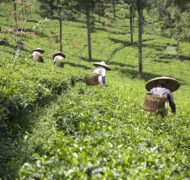Land Ownership and Property Rights (Numbers 26-27; 36:1-12)
Bible Commentary / Produced by TOW Project
As time passes and demographics change, another new census is needed (Num. 26:1-4). A crucial purpose of this census is to begin developing socioeconomic structures for the new nation. Economic production and governmental organization is to be organized around tribes, with their subunits of clans and household. The land is to be divided among the clans in proportion to their population (Num. 26:52-56), and the assignment is to be made randomly. The result is that each household (extended family) receives a plot of land sufficient to support itself. Unlike in Egypt—and later, the Roman Empire and medieval Europe—land is not to be owned by a class of nobles and worked by a dispossessed class of commoners or slaves. Instead, each family owns its own means of agricultural production. Crucially, the land can never be permanently lost to the family through debt, taxation, or even voluntary sale. (See Lev. 25 for the legal protections to keep families from losing their land.) Even if one generation of a family fails at farming and falls into debt, the next generation has access to the land needed to make a living.
The census is enumerated according to male heads of tribes and clans, whose heads of households each receive an allotment. But in cases where women are the heads of households (for example, if their fathers die before receiving their allotment), the women are allowed to own land and pass it on to their descendants (Num. 27:8). This could complicate the ordering of Israel, however, because a woman might marry a man from another tribe. This would transfer the woman’s land from her father’s tribe to her husband's, weakening the social structure. In order to prevent this, the Lord decrees that although women may “marry whom they think best” (Num. 36:6), “no inheritance shall be transferred from one tribe to another” (Num. 36:9). This decree holds the rights of all people—women included—to own property and marry as they choose in balance with the need to preserve social structures. Tribes have to respect the rights of their members. Heads of household have to respect the needs of society.
In much of today’s economy, owning land is not the chief means to make a living, and social structures are not ordered around tribes and clans. Therefore, the specific regulations in Numbers and Leviticus do not apply directly today. Conditions today require different specific solutions. Wise, just, and fairly enforced laws respecting property and economic structures, individual rights, and the common good are essential in every society. According to the United Nations Development Programme, “The advancement of the rule of law at the national and international levels is essential for sustained and inclusive economic growth, sustainable development, the eradication of poverty and hunger and the full realization of all human rights and fundamental freedoms.”[1] Christians have much to contribute to the good governance of society, not only through the law but also through prayer and transformation of life. And increasingly, Christians are discovering that by working together, we can provide effective opportunities for marginalized people to gain permanent access to the resources needed to thrive economically. One example is Agros International, which is guided by a Christian “moral compass” to help poor, rural families in Latin America acquire and successfully cultivate land.[2]





